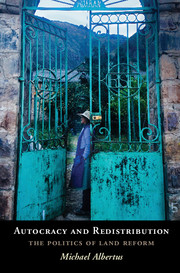Book contents
- Frontmatter
- Contents
- List of Tables
- List of Figures
- Acknowledgments
- 1 Introduction
- 2 Actors, Interests, and the Origins of Elite Splits
- 3 A Theory of Land Reform
- 4 Measuring Land Reform
- 5 A Cross-National Analysis of Land Reform in Latin America
- 6 Elite Splits and Redistribution under Autocracy: Peru's “Revolution from Above”
- 7 Land Reform Transformed to Redistribution: Venezuela's Punto Fijo Democracy and Chávez's Bolivarian Revolution
- 8 Latin America in Comparative Perspective
- 9 Conclusion
- References
- Index
- Other Books in the Series
8 - Latin America in Comparative Perspective
Published online by Cambridge University Press: 05 October 2015
- Frontmatter
- Contents
- List of Tables
- List of Figures
- Acknowledgments
- 1 Introduction
- 2 Actors, Interests, and the Origins of Elite Splits
- 3 A Theory of Land Reform
- 4 Measuring Land Reform
- 5 A Cross-National Analysis of Land Reform in Latin America
- 6 Elite Splits and Redistribution under Autocracy: Peru's “Revolution from Above”
- 7 Land Reform Transformed to Redistribution: Venezuela's Punto Fijo Democracy and Chávez's Bolivarian Revolution
- 8 Latin America in Comparative Perspective
- 9 Conclusion
- References
- Index
- Other Books in the Series
Summary
This chapter moves away from Latin America to examine land reform in other regions of the world. The principal task is to investigate whether the main theoretical argument linking elite splits and institutional constraints to land redistribution holds beyond the specific geographical context of Latin America. I explore this point in three interlocking steps. Chapter 9 takes up alternatives to land redistribution in the form of land negotiation and land colonization.
First, I introduce an original and complete account of all cases of redistributive land reform that have occurred outside of Latin America since 1900 as well as the conditions under which these reforms have occurred. Redistributive land reform is far from limited to Latin America. There have been fifty-four episodes of land redistribution across forty-five countries outside of Latin America since 1900, spanning every region of the world. Including Latin America, more than one-third of all the countries in the world experienced redistributive land reform in the last century. Many more have implemented large-scale programs of land colonization and land negotiation. Still others – perhaps most notably France – delved into reform prior to the last century. The episodes of land redistribution outside of Latin America in the last century alone have resulted in the redistribution of hundreds of millions of hectares of land to hundreds of millions of rural inhabitants. The political determinants of these reforms largely mirror those that have been found in the context of Latin America to be most conducive to reform: a coalitional split between ruling political elites and landed elites alongside low institutional constraints to rule. More than 80 percent of redistributive land reforms beyond Latin America have occurred under these circumstances. Those that have not, typically as a result of higher institutional constraints, are overwhelmingly minor reforms.
A simple accounting of the cases and conditions of land redistribution, although suggestive, is nonetheless subject to potential bias due to selection on the dependent variable. I therefore double down on this exercise and conduct a global statistical analysis on this panel dataset of land redistribution since 1900. I find strong evidence in support of the theory that land redistribution occurs most frequently when there are both coalitional splits between ruling political elites and landed elites and low institutional constraints to rule.
- Type
- Chapter
- Information
- Autocracy and RedistributionThe Politics of Land Reform, pp. 266 - 303Publisher: Cambridge University PressPrint publication year: 2015



